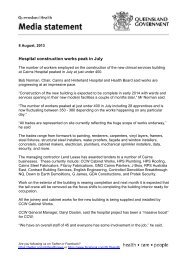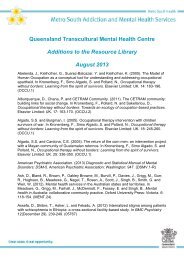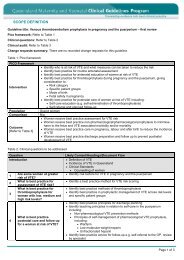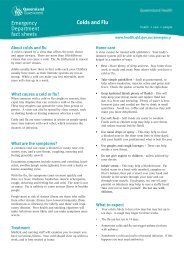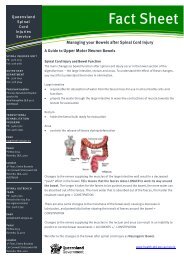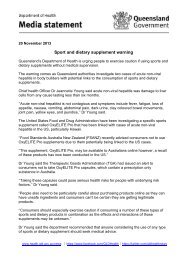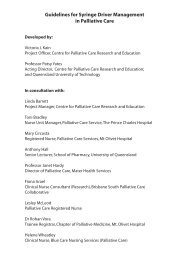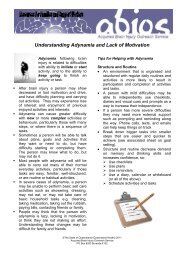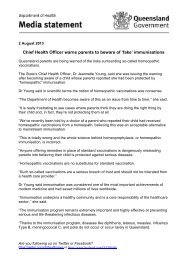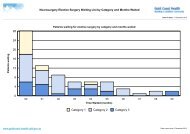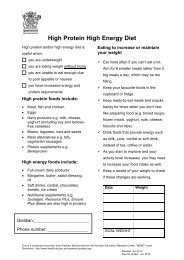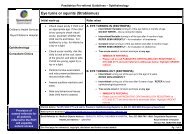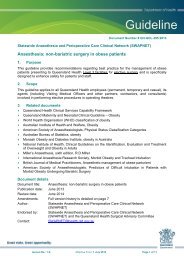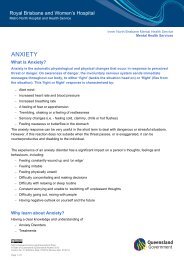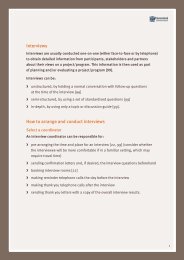Paediatrics - Queensland Health - Queensland Government
Paediatrics - Queensland Health - Queensland Government
Paediatrics - Queensland Health - Queensland Government
Create successful ePaper yourself
Turn your PDF publications into a flip-book with our unique Google optimized e-Paper software.
Gastrointestinal problems<br />
Fluid resuscitation regime for severe dehydration<br />
is based on 10% dehydration (person weighs 10% less than their usual weight)<br />
Initial treatment<br />
• 20 mL / kg<br />
• Reassess<br />
• Give second bolus of 20 mL / kg if still shocked<br />
• Ongoing fluids as discussed with MO<br />
• Re-hydrate / resuscitate severely dehydrated child with normal saline or IV Hartmann’s<br />
solution only [1]<br />
• Contact MO for ongoing fluid orders<br />
• Common IV fluids used in children for ongoing maintenance or replacement include<br />
normal saline or normal saline + 5% glucose [1]<br />
Arrangements should be made to transfer child to a paediatric centre. Ongoing fluid input<br />
should be managed in consultation with a Paediatrician<br />
5. Follow up<br />
Evacuation / hospitalisation of children with moderate (if indicated) or severe<br />
dehydration<br />
Children with mild dehydration i.e. < 5% and no clinical signs review in 24 hours<br />
or earlier if parent / carer is concerned that child is worse<br />
Inform the carer that bowel actions may not return to normal for 2 weeks but a<br />
child with continuing watery diarrhoea should be reviewed by a MO<br />
Children with watery diarrhoea lasting longer than 2 - 3 days should have bloods<br />
taken for electrolytes, babies may require this earlier<br />
Reassurance, education and advice concerning hand washing, personal hygiene,<br />
avoiding food preparation, and public swimming pools until diarrhoea has settled<br />
Place child on care plan with individualised review and weighs according to<br />
severity and family situation<br />
If diarrhoea continues beyond 10 days. See Child with chronic diarrhoea flow<br />
chart<br />
Alert other parents of young children in the community of current gastrointestinal<br />
illness and the need to present early to clinic if their child displays any gastro-<br />
intestinal symptoms<br />
Advise parent / carer(s) [1]<br />
• Use methods to help children drink e.g. cup, iceblock, bottle, syringe<br />
• Do not give medicines to reduce vomiting and diarrhoea. They do not work and may<br />
be harmful<br />
• Your baby or child is infectious so wash your hands well with soap and warm water,<br />
particularly before feeding and after changing nappies<br />
• Keep your child away from other children as much as possible until the diarrhoea<br />
has stopped<br />
• Return to clinic if:<br />
-- child is not drinking and still has vomiting and diarrhoea<br />
-- child is vomiting frequently and seems unable to keep any fluids down<br />
-- child is dehydrated e.g. not passing urine (< 3 wet nappies), is pale and has lost<br />
weight, sunken eyes, cold hands and feet, or is hard to wake up<br />
-- if your child has a bad stomach pain<br />
-- if there is any blood in the faeces<br />
-- if there is any green vomit, or you are worried for any other reason<br />
608<br />
Controlled copy V1.0<br />
Primary Clinical Care Manual 2011



